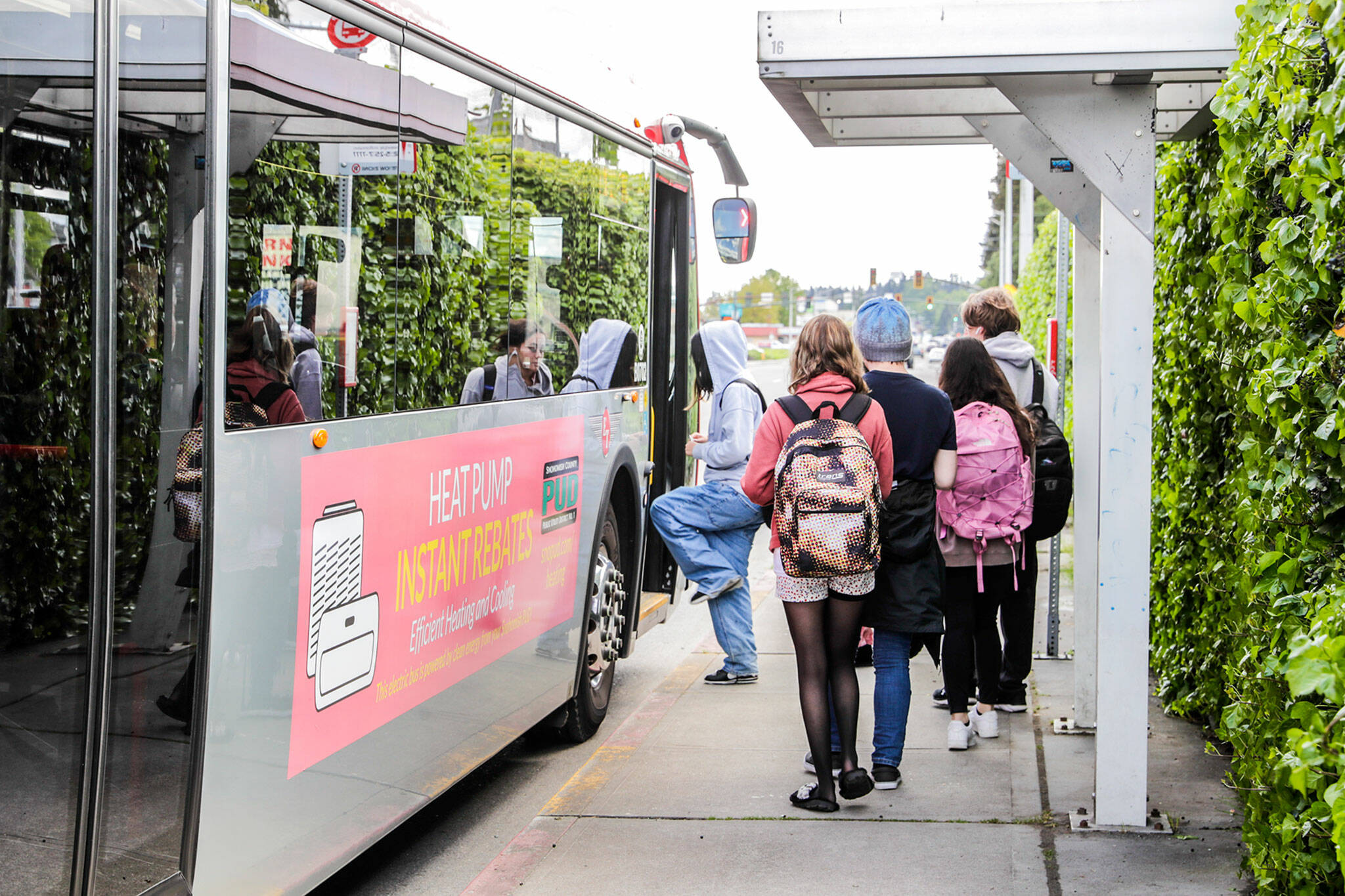EVERETT — As soon as July, children 18 and under could board Everett Transit buses without cobbling $1.50 for fare.
The city-run agency is considering changing its fare policy to let them ride for free.
The Legislature’s 16-year, $17 billion Move Ahead Washington transportation package is pushing Everett and other agencies including Community Transit and Washington State Ferries to make the move. Transit agencies that do will be eligible for a cut of the package’s transit support grants totaling $1.45 billion.
It could bolster Community and Everett transit’s budgets by millions annually.
“Everybody recognizes there’s real value to this,” Everett Transit director Tom Hingson said.
He sees it as a boost for families that can’t or don’t drive. Everett’s current fare policy lets two children five and under board with an adult who pays at most $2. But if the children are older than 5, that fare is $1.50 per kid. A parent with two preteens might pay $10 roundtrip to get to the grocery store and back.
Community Transit CEO Ric Ilgenfritz said he and staff are working with all of the ORCA card partners, including Everett, to roll out a system by the fall. He also said letting children board without fares benefits families.
“It’s giving youth and parents more flexibility to plan their lives and make their schedules work,” Ilgenfritz said. “Having easy access to the transit system will help kids learn to navigate the community, explore.”
A majority of the Everett City Council signaled support for the change after he presented it at Wednesday’s meeting. The council sets fare policy. Council members are scheduled to hold a public hearing and likely vote at the next meeting at 6:30 p.m. June 1.
“I’m happy to see this,” Councilmember Ben Zarlingo said. “Transit is what we’re going to need to handle the growth we have without building tons of extra roads, which we don’t have the money for or the room for.”
Transit agencies have until October to adopt the youth fare policy to receive the state grant money that is capped for the largest agency and boosts some smaller ones.
Everett Transit collected less than $100,000 in youth fare revenue, which included contracts with the Everett and Mukilteo school districts, last year.
It could add $758,427 from state grants between this October and June 2023. After that, Everett estimates $2 million annually.
“We’re trading about $100,000 for $2 million, which is not a bad economic decision,” Hingson told the council.
Community Transit stands to gain more. It collected about $529,000 in youth fare in 2019 and could get $12.1 million annually from state transit support grants.
Other than the youth fare policy and prohibiting reduction of service, the money comes without strings.
That means they can buy new buses, expand facilities and services, or recoup lost revenue from youth fare collection, said state Sen. Marko Liias, , D-Everett, chair of the Senate Transportation Committee and architect of Move Ahead Washington.
“I want to make sure cost isn’t a barrier to riding transit,” he said.
Everett Transit hasn’t decided how it will use the new money, but is continuing to replace old diesel buses with new battery electric ones. The city is on track to have its entire 41-bus fixed-route fleet go electric by 2028.
But ORCA card agencies are still figuring out the best way to implement the change. They’re likely sticking with the transit card, which works on Community Transit, Everett Transit, King County Metro, Kitsap Transit, Pierce Transit, Sound Transit and Washington State Ferries.
“Bus drivers, they’re not going to be able to tell the difference between an 18-year-old and a 21-year-old,” Ilgenfritz said.
Everett’s potential early start on the new policy could let youths ride its buses for free to a host of events this summer: Sorticulture in June, Independence Day festival and fireworks, Jetty Island days, and Everett 3on3 basketball tournament in July.
The city’s initial process for youths to board without paying is as simple as showing a student ID if they have one.
“Our point here is not to think of reasons why someone shouldn’t ride the bus,” Hingson said. “There’s going to be a lot of grace among our drivers.”
Community Transit participated in a regional program for free ORCA cards loaded with $10 to high school students in 2018. It gave out 8,723 cards to Snohomish County students whose schools were near transit.
After its grant-funding ended, the agency started its own pilot program last year at Mariner and ACES high schools. But the new legislation outpaced that effort.
Instead Community Transit’s board of directors is likely to take up the youth fare policy change in September.
Ben Watanabe: 425-339-3037; bwatanabe@heraldnet.com; Twitter: @benwatanabe.
Talk to us
> Give us your news tips.
> Send us a letter to the editor.
> More Herald contact information.

























